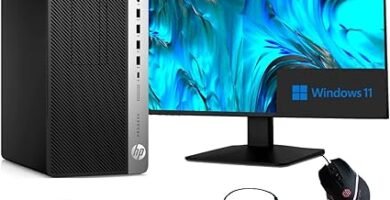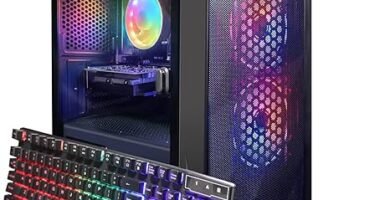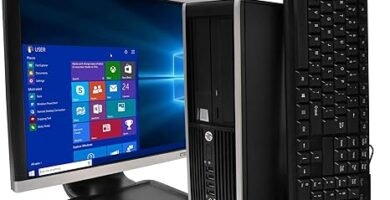
Computer Operating System
Operating systems (OS) are essential software that enable computers to manage hardware and software resources. Without an operating system, your computer would be unable to run applications, manage files, or connect to the internet. In this article, I’ll explore the key features, pricing, pros, cons, and comparisons between different operating systems, based on my experiences with multiple OS platforms.
Characteristics of a Computer Operating System
A Computer Operating System serves as the bridge between the user and the computer hardware. Whether it’s Windows, macOS, Linux, or Chrome OS, each operating system has unique strengths. Windows is well-known for its extensive software compatibility, making it a go-to for gaming and business use. macOS, in contrast, is popular for its sleek user interface and seamless integration with Apple’s ecosystem, which includes iPhones, iPads, and other devices. Linux, meanwhile, stands out for its flexibility and customization options, making it ideal for developers and tech enthusiasts.
Operating systems also manage key functions like file handling, memory management, and security. For example, Windows 11 includes features like Snap layouts, enhancing productivity by allowing users to easily arrange open windows. macOS offers unique functionalities like Handoff, which lets users switch between Apple devices effortlessly. Linux distributions such as Ubuntu or Fedora are often chosen for their strong security features and resource efficiency, particularly in server environments.
Why Are Computer Operating Systems Priced the Way They Are?
The price of a Computer Operating System is influenced by factors such as licensing fees, development costs, and the specific features offered. For instance, Windows and macOS are both commercial operating systems with associated costs. Windows, often bundled with new PCs, has different editions like Windows 11 Home or Windows 11 Pro, the latter being more expensive due to additional security and management features for businesses. macOS is exclusive to Apple devices, meaning its cost is built into the premium price of Apple hardware.
On the other hand, Linux distributions like Ubuntu, Debian, or Fedora are open-source and free to use, which reduces the overall cost for the user. However, Linux may require a steeper learning curve and technical knowledge, which can increase setup and maintenance costs, especially for users unfamiliar with the system.
Comparing Computer Operating Systems with Similar Products
Choosing the right OS depends largely on your use case. Windows is incredibly versatile, making it a strong contender for both gaming and professional tasks. The sheer number of applications available on Windows—from gaming software to professional suites like Microsoft Office—makes it a dominant choice in many sectors. macOS, in contrast, is favored by creative professionals for tasks like graphic design, video editing, and music production due to its seamless performance with software like Final Cut Pro and Logic Pro.
For developers, Linux provides unmatched flexibility. It’s highly customizable and offers an excellent environment for programming, server management, and cybersecurity tasks. For those seeking a more lightweight, cloud-based option, Chrome OS is perfect for users who rely mainly on web-based applications, such as students or those using Chromebooks in education settings.
Pros and Cons of Different Computer Operating Systems
Each OS has its own strengths and weaknesses, which should be considered based on your specific needs:
Pros:
- Windows: Excellent software compatibility, strong gaming support, and widely used in business settings.
- macOS: Polished user experience, optimized for creative work, tightly integrated with other Apple devices.
- Linux: Free and open-source, highly customizable, ideal for development and server use.
- Chrome OS: Lightweight, fast, highly secure, and perfect for web-based tasks.
Cons:
- Windows: Prone to security vulnerabilities, regular updates are necessary, and it comes with licensing costs.
- macOS: Limited to Apple hardware, high cost of entry, not as strong for gaming.
- Linux: Steeper learning curve, fewer software options compared to Windows and macOS.
- Chrome OS: Limited functionality for power users, unsuitable for gaming or heavy computational tasks.
Advantages of Using a Computer Operating System
One of the most significant advantages of modern operating systems is the productivity and efficiency they bring to the user. Windows 11 offers great multitasking capabilities with features like Virtual Desktops and Task View, allowing users to manage multiple workflows easily. macOS is prized for its smooth integration with Apple hardware, offering features like Continuity, which allows users to start a task on one Apple device and continue it on another seamlessly.
Meanwhile, Linux allows for unparalleled customization, making it possible to configure your system exactly the way you want, whether for personal use, as a development environment, or as a server. Chrome OS is ideal for those who prefer simplicity and speed, particularly when most tasks are performed online.
Additional Benefits of a Computer Operating System
Beyond the core functions, operating systems are evolving to incorporate more advanced and innovative features. Windows includes Cortana, its voice-activated assistant, while macOS offers features like Time Machine, which simplifies backing up data. Linux distributions like Ubuntu are often praised for their robustness in security, largely due to their open-source nature, which allows users to inspect and improve the system’s code.
In the case of Chrome OS, users benefit from automatic updates and built-in security, reducing the risk of malware and other threats. This simplicity makes Chromebooks a popular choice in educational environments.
User Opinions on Computer Operating Systems
Users have varying opinions about different operating systems, depending on their specific needs and expectations. Windows is favored by gamers and business professionals for its versatility and wide application support. Creative users often praise macOS for its smooth performance and integration with software like Adobe Creative Cloud. Linux users, typically developers or IT professionals, love the freedom and control the system offers, while Chrome OS users appreciate its ease of use and fast boot times, especially in school or workplace settings where simplicity is key.
Frequently Asked Questions
Which operating system is best for gaming? Windows is the preferred choice for gaming, thanks to its compatibility with a wide range of games and support for powerful hardware.
Is Linux better for programming than Windows? Yes, Linux is often the preferred platform for developers due to its powerful command-line tools, flexibility, and server management capabilities.
Can macOS be installed on non-Apple hardware? Legally, macOS can only be installed on Apple hardware. Installing it on non-Apple devices (known as Hackintosh) can lead to technical issues and is against Apple’s terms of service.
Conclusions on Computer Operating Systems
Choosing the right Computer Operating System depends on your specific needs and preferences. For those who need broad compatibility and software support, Windows is an excellent choice. If you’re already embedded in the Apple ecosystem and value a clean, user-friendly interface, macOS is ideal. For tech enthusiasts or developers who prefer control over their system, Linux provides a customizable, powerful environment. And for users who prioritize simplicity and fast access to web-based applications, Chrome OS is the perfect fit.
Each OS has its pros and cons, but with the right choice, your operating system will help you maximize productivity, performance, and enjoyment.

How to Improve Your PC’s

Tips to Keep Your PC

How to Choose the Perfect PC

Personal Computer Use

Laptop Computers
- 【21.5″ FHD Display】21.5″ diagonal FHD VA ZBD anti-glare WLED-backlit three-sided micro-edge display, 250 nits, 72% NTSC …
- 【Intel Celeron J4025】Intel Celeron J4025 (Base 2.0 GHz, up to 2.9 GHz Burst Frequency, 4 MB Cache, 2 cores, 2 threads). …
- 【Superior Storage and Multitasking】Enjoy seamless multitasking with Upto 64GB of high-speed RAM and embrace blazing-fast…
- 【High Speed RAM And Enormous Space】16GB DDR4 RAM to smoothly run multiple applications and browser tabs all at once; 512…
- 【Processor】Intel Celeron J4025 processor (2 Cores, 2 Threads, 4MB Cache, Base 2.0GHz up to 2.4GHz Max Turbo Frequency)
- 【Display】21.5″ diagonal FHD VA ZBD anti-glare WLED-backlit three-sided micro-edge display, 250 nits, 72% NTSC (1920 x 10…
- Efficient Performance: Equipped with 4GB high-speed DDR3 memory, 128GB SSD storage and faster, smoother and energy-effic…
- Powerful configuration: Equipped with the Core i3 processor, turbo frequency up to 2.4 GHz. With a 17 inch screen laptop…
- Lightweight and Thin: Equipped with a 8000 mWh lithium-ion battery, long battery life. It has a long battery life and re…



